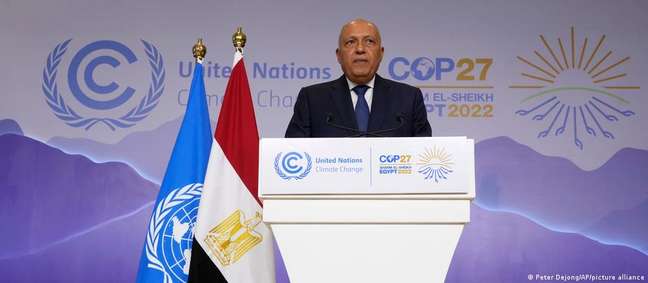Countries agree with the final statement, providing reparations to nations most affected by climate change and the phasing out of coal as an energy source. The EU and environmentalists judge the agreement insufficient: the participants in the 27th United Nations Conference on Climate Change (COP27) agreed on the creation of a compensation fund for the damages linked to climate change in particularly vulnerable countries, a historic request by the most poor, who had been pushing for decades for the creation of such a mechanism.

Two days late, COP27’s nearly 200 members unanimously endorsed the decision at the start of a middle-of-the-night plenary session in Egypt. A round of applause celebrated this Sunday morning (20/11) the approval of the compensation office, after a long negotiation that lasted until dawn.
This comes after the G77 group – a coalition of 134 developing countries – which has long called for industrialized nations to pay reparations for climate damage, added the issue to the official COP agenda for the first time.
The talks were due to conclude on Friday, but disagreements on key issues prompted the conference to prolong the meeting.
“The work we’ve been able to do here over the past two weeks and the results we’ve achieved together are testament to our collective willingness, as a community of nations, to deliver a clear message that resonates loudly here in this room and around the world today.” : that the multilateralism of diplomacy still works,” COP President Sameh Shoukry, Egypt’s foreign minister, said at the end of the conference.
coal disposal
In their final statement, released Sunday morning, the nearly 200 states also reaffirmed their earlier decision to phase out coal as an energy source. A farewell to oil and gas is not mentioned. Oil and gas producing countries such as Saudi Arabia and China have strongly opposed the inclusion of these fuels.
The declaration, therefore, falls short of the demands of many countries, climate activists and environmentalists who see it as imperative to end dependence on fossil fuels.
The new compensation fund aims to mitigate the inevitable consequences of global warming, such as increasingly frequent droughts, floods and storms, as well as rising sea levels and desertification. Concrete amounts not mentioned The issue was the main point of discussion during the two-week conference in the Egyptian resort of Sharm el-Sheikh which lasted over 36 hours.
The decision doesn’t mention any amount for the new fund or who exactly should pay for it. This will be clarified later. Particularly at risk developing countries should be favourites. Especially the European Union has insisted on this limitation.
In the final declaration, nations are also called upon to improve their climate protection plans no later than the next climate conference, to be held in the UAE in late 2023. The improvements remain voluntary, not mandatory.
“Signature Required”
The United States initially blocked the creation of the compensation fund, while the G77, together with China, increased the pressure. After initial reluctance, the European Union has finally changed its mind. UN Secretary-General António Guterres hailed the new climate damage fund as an important step towards justice. “Certainly this is not enough, but it is an urgently needed signal to rebuild lost trust,” Guterres said.
One of the controversial aspects of the issue is the role of China. The country, which ranks first in the emission of climate pollutants, wants to continue to be treated, in terms of international climate protection, as a developing nation. This was stipulated in the Kyoto Protocol 30 years ago. Western countries no longer want to classify China as a beneficiary country due to its economic power and its role as the largest emitter of greenhouse gases. Chinese negotiator Xie Zhenhua said developing countries should receive the money but gave priority to “vulnerable states”.
Guterres accused COP27 of failing on key objectives. The UN secretary-general said in Sharm el-Sheikh that the “dramatic emission reductions” needed to curb global warming could not be made. “Our planet is in the emergency room,” Guterres said. “We need to drastically reduce emissions and the climate conference failed to address this problem.”
“New chapter in climate policy”
“Hope and frustration coexist in the result”, admitted the Foreign Minister of Germany, Annalena Baerbock, at the end of the meeting. She welcomed the fact that “a breakthrough in climate justice” was achieved with the creation of the climate compensation fund.
But he found it frustrating that “because of the lockdown in some major oil-emitting and producing countries, long-needed measures to reduce and phase out fossil fuels have been stymied.”
Criticism of the EU and environmentalists
European Union Vice-President Frans Timmermans sharply criticized the agreement. “This is the crucial decade, but what we have ahead of us is not enough progress for people and the planet,” said Timmermans, who is also the European Commissioner for Climate. For him, the agreement does not oblige the major emitters to make further efforts to reduce the emission of gases that cause the greenhouse effect ever more rapidly. “We will not stop fighting for more,” said Timmermans.
The outcome was “depressing” and goes no further than last year’s climate conference, according to climate expert Jan Kowalzig of Oxfam in Germany. “It is very disappointing that the much-needed abandonment of all fossil energies does not appear in the final text, even though several countries have asked for it,” he complained.
The executive director of Greenpeace in Germany, Martin Kaiser, praised the reparations decision, but warned: “Now those who caused the climate crisis must take their responsibilities and contribute adequately to the new relief fund.”
md (DPA, Reuters, AFP)
🇧🇷The best content in your email for free. Choose your favorite Terra newsletter. Click here!
Source: Terra
Camila Luna is a writer at Gossipify, where she covers the latest movies and television series. With a passion for all things entertainment, Camila brings her unique perspective to her writing and offers readers an inside look at the industry. Camila is a graduate from the University of California, Los Angeles (UCLA) with a degree in English and is also a avid movie watcher.






